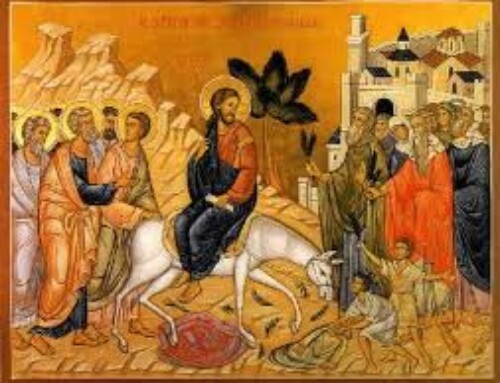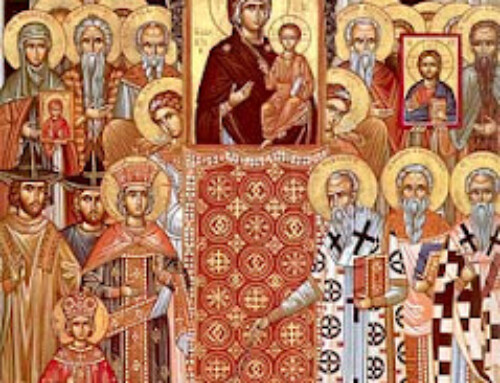From The Word Magazine, April 1983, Page 12-13
GREAT LENT
by Father Matthew George
Great Lent approaches and we are faced again with the queshion – as Orthodox Christians, “What can I do during the Lenten Season to make this Easter, the death and resurrection of our Lord and Savior Jesus Christ, to take on its true meaning?” As adults, we are given a vast number of opportunities for self denial, both in a physical as well as monetary manner. We are able to grasp the intensity ofthe season, this Pascha, when our Lord gave up his life for us that we may inherit eternal life in the Kingdom of God. However, to a child this season is a series of confusing concepts and practices that we as parents and teachers expose them to. One group teaches them that to give up sweets or desserts is a great enough sacrifice. Others tell them that you should pray to God with more feeling. This includes closing their eyes tighter and distorting their faces in their evening prayers. While these ideas are not wrong they are not nearly enough to lead the child toward a true understanding of the Great and Holy Easter and to help the child incorporate its meaning into their lives. Thus, we as the teachers are placed in a difficult position. We must help these children, our students, sons and daughters, discover what the meaning of Pascha is. Unfortunately, this meaning escapes many of us adults.
The Orthodox Church gives us three basic practices to pursue especially vigorously during this season — prayer, fasting and almsgiving. For the child these practices can take on many meaningful forms. The idea of giving up sweets is an excellent start but take it a step further and tell the child to take the money he or she would normally spend on candy or cakes and put it aside. This money can later be given to a charity or spent on an item such as a toy and given to an orphanage or on food that can be given to a shelter that feeds the homeless and aged. Another type of physical denial can come in the form of daily habits such as watching television or listening to the stereo. Tell the child that during Lent they should turn off the television for one or two hours and use that time to read the Bible, for instance the Gospels or a book on their religion. A good book for them to read is the Orthodox Church by Timothy Ware or the 4 volume series on the Orthodox Faith by Fr. Thomas Hopko. These books are available from St. Vladimir’s Bookstore, 575 Scarsdale Road, Crestwood, New York 10707. These books are easy to read for the junior high and high school student. The bookstore also offers a number of books for younger children but your local parish priest or the Orthodox Christian Education Commission, P.O. Box 174, Centuck Station, Yonkers, NY 10710, can be a great help in selecting books for these younger ages. A safe selection is always the Bible-based Arch series available from any denominational bookstore.
Another area that is greatly neglected during Lent is the child’s prayer and church life in general. Lent is a good time to emphasize this practice and make it a part of the child’s daily life so that he/she can continue it through the entire year. We can first help the child by giving his prayers a basic structure. Have them begin with the Lord’s prayer, and the Creed (depending on age, begin around 8 years), and then their remembrances (i.e., mother, father, etc.). These two prayers are a statement of their faith. Both prayers express the beliefs of the Orthodox Church that are so important to their spiritual life. The step we must make as teachers and parents is to help them slowly grow into an understanding of these prayers. You should also add special lenten prayers such as that of St. Ephraim the Syrian (“0 Lord and Master of my life…”). There are 40 days during Lent and by breaking these prayers down piece by piece, not only will they begin to understand them better but we also can learn from the experience (but don’t start this until they are at least 8).
During the Lenten season we can helpthe children to increase their understanding of their church by involving them in its organization. Too often the children are kept on the outside of the church structure and not allowed to even see the running of their church until they are adults. During Lent the children can be encouraged to take time from their play and television and volunteer their service to the church. Your parish priest always has little things that they can do, (i.e., cleaning, polishing, planting flowers, etc.). They also can be encouraged to give some of their savings to a particular aspect of the church, such as offering bread or the coffee hour. (Their funds can be supplemented by our own.) Ideas such as these helps your child begin to feel part of that church that seems to be run by adults and for adults. They will see their money being used to fund the running of their church and will help them feel like they belong. We can help along this feeling of belonging by explaining to the child what it takes to run their church and what the priest does with the money. This idea can be directed at children of junior high and high school ages. Instruction in church structure will not only increase understanding but will prepare the youth for a position they all too soon may hold, the leadership of the church.
The children can also be encouraged to give of themselves in volunteer work. Many agencies hire junior high and high school ages. However, the younger children can volunteer to visit with older people in the parish who have no one to keep them company. This type of activity will help both the child and the elderly. The child will learn many things about life from one of our greatest sources of knowledge, the elder citizen, and the older people in your parish will find a new source of hope and enjoyment in the youth of our parish. Several students in a particular class might even arrange to do the weekly shopping for a shut-in or handicapped person.
Whatever activity you direct your child toward, two things should be kept in mind. First, the denial of oneself is very important. It will bring into focus the denial of Christ, how he gave totally of himself so that we could benefit. The second, is that by denial of yourself you should fulfill someone else’s life. Christ denied himself for us and for God the Father. He died so that we could live. During Lent all of our activities should center around the Church teachings and practices. Ignorance of our faith is a fault we all share. The lenten period offers us a great opportunity to learn the essential teachings of our Church, Christ’s ministry, crucifixion, death and resurrection. The important step comes when we can share these teachings with others, especially the youth of our church. It is in our hands to direct the children in the proper lenten practices of their Church. If we can properly instill in them the importance of these teachings we can accomplish something very important. First, their lives will take on a more Christian shape. Love and caring will become words they will not throw round so haphazardly. They will begin to understand the necessity for a moral structure in their lives. They will also learn to care for their church and they will keep it alive through difficult periods. Lent will bring us close to the
Church we so often deny during the year. God continually gives us the opportunity to regain the Church and to care for it as He cares for us. He has placed in our hands the responsibility of teaching our children; let us not refuse the offer. So now Lent approaches again and another chance is available. Make this the year that the Church takes on its proper role in your life. It is up to us to teach the children about the life of Christ so that the Church may truly prosper both in their lives and in their leadership. The responsibility is ours, the children are depending on us!
Father Matthew is interim pastor of Sr. Nicholas Cathedral in Brooklyn, New York.
This article was written for the OCEC Educational News Service.



